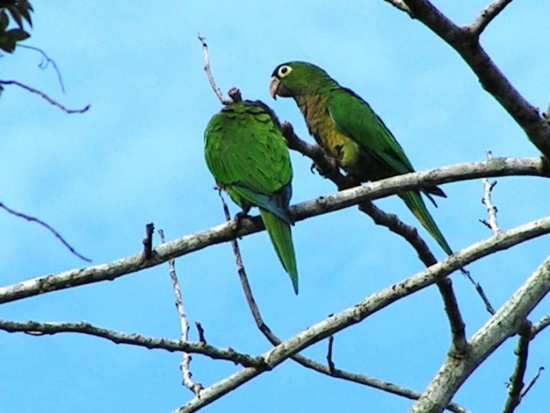(taxonomy, hab, behav, remove incomplete) |
(include, caption, taxon, refs) |
||
| Line 1: | Line 1: | ||
| − | [[Image:Olive-throated_Parakeet.jpg|thumb|550px|right|Photo by Carlos B <br/> Photographed: Tortuguero NP, [[Costa Rica]]]] | + | [[Image:Olive-throated_Parakeet.jpg|thumb|550px|right|Subspecies ''astec''<br />Photo by Carlos B <br/> Photographed: Tortuguero NP, [[Costa Rica]]]] |
| + | '''Includes Aztec Parakeet''' | ||
;[[: Category:Aratinga|Aratinga]] nana | ;[[: Category:Aratinga|Aratinga]] nana | ||
| Line 14: | Line 15: | ||
*''astec'' is found from south-east Mexico to [[Costa Rica]]/western [[Panama]] | *''astec'' is found from south-east Mexico to [[Costa Rica]]/western [[Panama]] | ||
| − | The Jamaican subspecies has in the past been considered a separate species from the Central American birds | + | The Jamaican subspecies has in the past been considered a separate species from the Central American birds; these were named Aztec Parakeet in Howell and Webb |
==Habitat== | ==Habitat== | ||
Forest edges and other semiopen areas, but also feeding on cropland, which causes conflicts with local farmers. | Forest edges and other semiopen areas, but also feeding on cropland, which causes conflicts with local farmers. | ||
| Line 21: | Line 22: | ||
Diet includes fruits, vegetables and the buds of many trees and cultivated crops. Feeding often occurs in flock. | Diet includes fruits, vegetables and the buds of many trees and cultivated crops. Feeding often occurs in flock. | ||
| − | + | ==References== | |
| + | #{{Ref-Clements6thAug11}}# Howell & Webb, 1995. A guide to the birds of Mexico and northern Central America. Oxford University Press. ISBN 0198540124 | ||
==External Links== | ==External Links== | ||
{{GSearch|Aratinga_nana}} | {{GSearch|Aratinga_nana}} | ||
[[Category:Birds]] [[Category:Aratinga]] | [[Category:Birds]] [[Category:Aratinga]] | ||
Revision as of 01:15, 22 May 2012
Includes Aztec Parakeet
- Aratinga nana
Identification
30cm. Green head, back, and tail, olive throat and upper breast, orange eyes, cream bare skin around the eye, olive lower body, grey feet. The younger birds tend to have dark irises.
Distribution
Jamaica, and the Caribbean slope of Mexico through Central America to extreme western Panama where it may even be irregular. Can be found as feral in other places including e.g., St. Thomas and the Dominican Republic.
Taxonomy
Three subspecies are recognized:
- nana is native to Jamaica
- vicinalis is found in north-east Mexico
- astec is found from south-east Mexico to Costa Rica/western Panama
The Jamaican subspecies has in the past been considered a separate species from the Central American birds; these were named Aztec Parakeet in Howell and Webb
Habitat
Forest edges and other semiopen areas, but also feeding on cropland, which causes conflicts with local farmers.
Behaviour
They nests in termite holes and lay 3-5 eggs which hatch in 26- 27 days. After hatching, it takes about 50 days until fledging.
Diet includes fruits, vegetables and the buds of many trees and cultivated crops. Feeding often occurs in flock.
References
- Clements, JF. 2011. The Clements Checklist of Birds of the World. 6th ed., with updates to August 2011. Ithaca: Cornell Univ. Press. ISBN 978-0801445019. Spreadsheet available at http://www.birds.cornell.edu/clementschecklist/downloadable-clements-checklist
- Howell & Webb, 1995. A guide to the birds of Mexico and northern Central America. Oxford University Press. ISBN 0198540124




